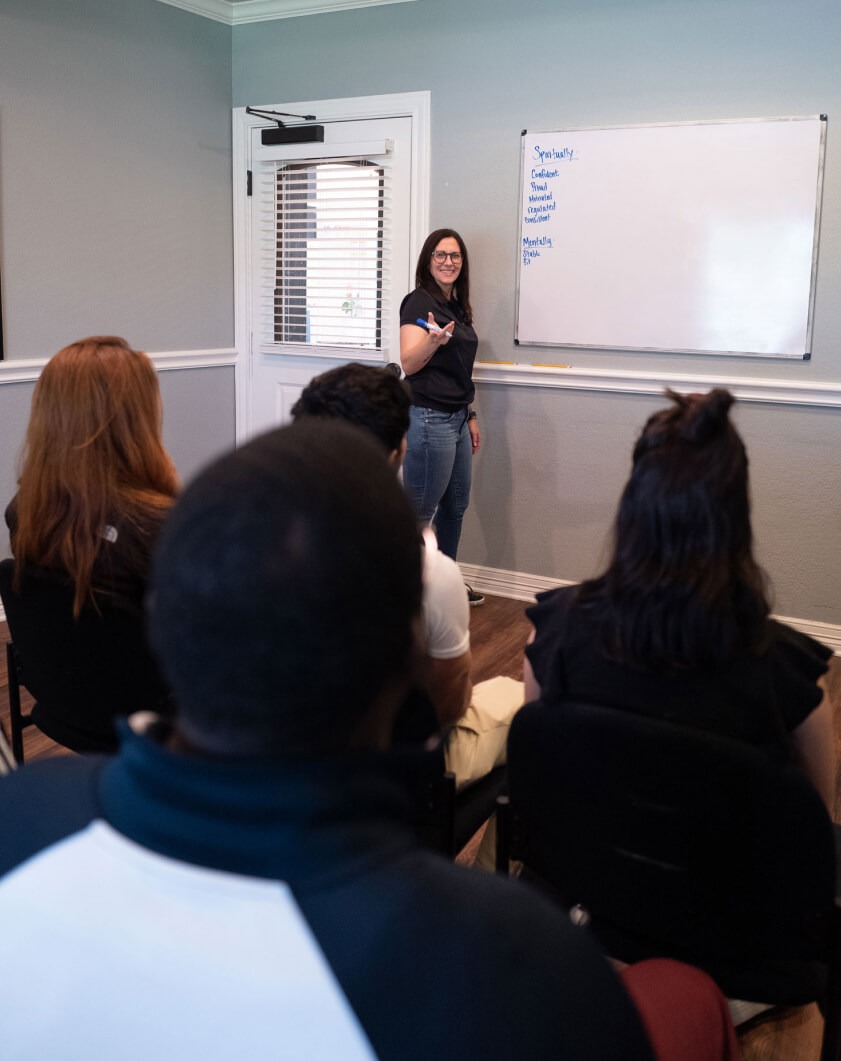Cognitive Behavioral Therapy in Austin
At Infinite Recovery, we believe in a holistic approach to addiction treatment. That’s why we provide cognitive behavioral therapy (CBT) in Austin for clients enrolled in our inpatient and outpatient programs. We want to help clients develop essential skills for lasting recovery through CBT for alcoholism and substance abuse.
Our experienced therapists combine CBT with various therapeutic methods. We’ll address your specific needs and empower you to break free from addiction and build a fulfilling life beyond it.

What is Cognitive Behavioral Therapy?
Cognitive behavioral therapy is one of the most common forms of psychotherapy and is used to help treat:
- Anxiety
- Depression
- Bipolar disorder
- Substance use disorders
- Relationship issues
- Mental health disorders [1] [2]
Unlike some forms of therapy, CBT deals primarily with the present moment and current thought patterns and problems, instead of evaluating a client’s past or asking them to share stories about prior traumas or emotions. [1] It is based on the idea that mental health and emotional issues are based on unhelpful patterns of thinking or cognitive distortions that result in harmful or unhelpful patterns of behavior. [2]
Clients who work with a therapist trained in CBT will learn to identify how thoughts are connected to unhealthy behaviors.Clients also develop new perspectives and healthy coping mechanisms for addressing the stressors in their lives.
This approach helps clients solve problems and develop new skills and ways of thinking, rather than the therapist giving advice about how an individual should react in a given situation. [2]
CBT can be utilized in individual therapy sessions, couples therapy, or group counseling settings.

How CBT Can Support Addiction Recovery
Addiction and substance abuse are often symptoms of underlying mental and/or emotional dis-regulation. Many individuals turn to substances to help alleviate stress, distract themselves from uncomfortable thoughts or emotions, and forget painful memories. Substance use soon becomes a habit and can easily develop into a physical dependence on drugs or alcohol to function or feel normal.
This is where cognitive behavioral therapy for alcoholism or drugs can be a powerful tool in recovery. By utilizing CBT as part of a holistic addiction treatment plan, individuals with substance use disorders can learn to process their feelings in helpful ways and develop behaviors that support their sobriety.
How CBT Can Address Mental Health Issues
Anxiety disorders, depression, bipolar disorder, and other mental illnesses are often related to negative thinking, false beliefs, and cognitive distortions that can escalate and spiral out of control if they are not addressed.
During cognitive behavioral therapy, a therapist will help reframe a person’s thoughts and practice coping skills for responding to challenging situations. They may also incorporate relaxation and mindfulness techniques and certain problem-solving strategies.
Often, individuals with a substance use disorder also have an underlying mental health disorder. CBT can be utilized to address both simultaneously, offering practical tools to address difficult situations and relationships. Overall, CBT for alcohol use disorder or CBT for substance use disorders can help you take control of your future.
What to Expect in a CBT Therapy Session
During your first meeting with your therapist, they will ask questions about your challenges and goals to determine whether CBT recovery is a good fit for your specific treatment needs. Your therapist will then ask you about current thoughts, emotions, and behaviors that are troubling you. While you may discuss your past during a CBT session, the focus will be on your present experience and pressing concerns.
The steps most commonly used in cognitive behavioral therapy include [3]
- Identifying the areas of your life that are most challenging. This could include things like substance use disorders and mental health symptoms, difficult relationships, or employment troubles.
- Identifying the thoughts and feelings that surround these challenges. In order to address the thoughts, emotions, and beliefs that are impeding development or causing distress, you first have to be aware of them. A trained CBT therapist can help you recognize the way you talk to yourself about certain situations and any subconscious beliefs you may hold about yourself or other people.
- Noticing where your perceptions may be inaccurate. By understanding your underlying thoughts and emotions around a particular topic, you can identify where you may be contributing to the problem by holding on to a particular mindset. A therapist can help you apply critical thinking and objectively evaluate your thought and emotion patterns to see where they may be harming rather than helping.
- Reframing thinking and setting goals. During this step of cognitive behavioral therapy, your therapist will help you identify new ways of approaching your problems and thinking about yourself and others.
CBT residential treatment is typically a goal-oriented approach, which means your therapist will likely give you exercises to try outside the session that will allow you to put your newfound skills and mindsets into practice.
Other Therapies We Offer
In addition to cognitive behavioral therapy, Infinite Recovery’s clinical team offers a number of traditional and innovative therapies that help with addiction recovery. Clients work with therapists one-on-one and in groups to explore and address the underlying cause of their addictive behavior from many angles. It’s common for our therapists and counselors to combine CBT with another therapeutic approach so that they can best meet the unique needs of each client.
Some of the other treatment options we provide through our Austin recovery programs include:
- ART Therapy (Accelerated Resolution Therapy)
- Boxing and Body Movement Therapy
- Cognitive Behavioral Therapy
- Family Therapy
- Family Dynamics Therapy
- Group Therapy
- Individual Therapy
- Motivational Interviewing
- Relapse Prevention Therapy
- Spirituality Therapy

Begin Your Recovery Journey Today
If you or a loved one are seeking an addiction recovery program that offers cognitive behavioral therapy in Austin, reach out to the team at Infinite Recovery today. We take a holistic, trauma-informed approach to addiction recovery and offer a range of treatment options that address our client’s mental health and the root causes of their addictive behavior. Clients work one-on-one with a local Austin therapist trained in CBT and other modalities.
Infinite Recovery provides a full range of treatment services at every level of care, including detox, inpatient treatment, outpatient programming, and alumni services. Our programs are covered in-network by most major insurance providers and our success rates are among the highest in the industry.
Remember, recovery is possible and addiction doesn’t define you. Get help today and rebuild your life stronger than ever.